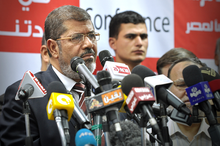Update 9:30 AM: Winner of the Presidential election is Muslim Brotherhood candidate Mohammed Morsi. The crowd is going wild, they seem to be in favor of this choice.
Tahir Square in Egypt has been filled to the brim the past few days as protestors wait to hear what people and which parties won their first democratic election in decades. That announcement will reportedly come any second now. BBC News Middle East is streaming. Google has set up multiple news/video feeds here.
No matter who wins, one thing is clear: Egypt has changed forever and that what happens today could quickly reach every nation on earth.
You young whippersnappers may not remember the carnage on the news every night, and you may not think what happens today in Egypt has any direct effect on us. If so, you are wrong. Before Egypt’s last leader, Anwar Sadat, signed the Camp David Peace Treaty with Israel in 1979, there was war waged every few years by various Arab countries with the goal of eliminating Israel as a nation. That all ended when Egypt was taken out of the equation, because Egypt is or was the largest and arguably most influential country involved in military and strategic terms. Sadat would pay for that lasting peace with his life.
Needless to say, how Egypt’s new government views that peace accord could have an enormous effect on the Middle East and, naturally, on the price of oil. After decades of peace, both Israel and neighboring states have changed markedly. Another war between Muslims and Jews today could quickly escalate to a full on regional conflict with modern fire and forget weapons that could shut down half the world’s energy production.
The consequences of even a relatively small production decrease could be brutal. A big jump would be catastrophic. Oil could skyrocket to 200 dollars a barrel or more, causing petro-inflation in virtually every good and service. It could cause the US and other nations to undergo the kind of pain we struggled with during the 1970s. In worst case scenarios, with Hubbert’s Peak looming, a moderate to severe oil shock might even throw the entire global economy into instant depression and sustained stagflation the likes of which we have never seen.
It all comes down to who wins, especially in the run off for President. That race is between former military commander Ahmed Shafiq and Muslim Brotherhood candidate Mohammed Morsi. Which one prevails, and more importantly, what they and Egypt’s military do with that Presidency, could have a big impact on US politics and foreign affairs. It could literally mean war or peace and prosperity vs poverty for untold millions.
What happens in Egypt matters a lot. Like it or not, we are now a global species and a global civilization, each part affects the whole. For all our sake, here’s hoping it goes well.


Talk about dashed hopes.
So much for the much vaunted Arab Spring.
The Muslim brotherhood are in charge.
Proof as in the palestinian elections that put Hamas in charge that, no, the Arabs do not choose wisely.
I strongly suspect the world will soon be wishing Mubarack or his sons were still in charge.
Hate to say it but a continuation of military control is the least bad option here.